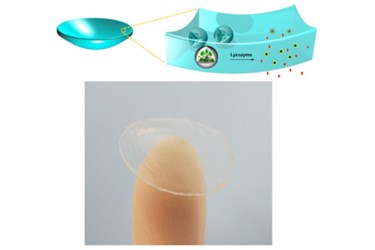Nanodiamond Contact Lenses Could Enable More Efficient Glaucoma Drug Delivery
By Joel Lindsey

Researchers at the UCLA School of Dentistry, led by Dr. Dean Ho, have developed a nanodiamond-embedded contact lens that may provide an effective way of delivering glaucoma medicine to patients’ eyes.
Details regarding the new device have recently been published in the journal ACS Nano.
Nanodiamonds are ball-shaped diamonds typically about 5 nm in diameter. A great deal of recent drug delivery research has been invested in nanodiamonds, since they bind well with many drug compounds and enable slow, extended release.
In the new UCLA design, nanodiamonds carrying timolol, a compound commonly used to treat glaucoma, are attached to the contact lenses. Timolol is then released when the nanodiamonds come into contact with lysozyme, a common enzyme in human tears, according to a press release published on UCLA’s website.
Ho and his team of researchers have reported that the nanodiamond contact lenses may provide more effective treatment than traditional timolol eye drops by maximizing the amount of drug that actually reaches the intended site and by avoiding any excess delivery of the drug.
Traditional eye drops can in some cases lead to inefficient treatment, with as little as 5 percent of the drug making it to the treatment site. Similarly, “burst release,” where the drug is delivered too quickly, can cause the drug to “leak” out of the treatment site and can sometimes lead to dangerous side effects, the press release explained.
“In addition to nanodiamonds’ promise as triggered drug-delivery agents for eye diseases, they can also make the contact lenses more durable during the course of insertion, use and removal, and more comfortable to wear,” said Ho.
Previous studies conducted at UCLA have focused on using nanodiamonds to deliver chemotherapy drugs directly to cancer patients’ brain tumors.
The development and testing of the nanodiamond contact lenses have so far been supported by the National Cancer Institute, the National Science Foundation, the Wallace H. Coulter Foundation, The V Foundation for Cancer Research, the Society for Laboratory Automation and Screening, Beckman Coulter Life Sciences, and Singapore’s Agency for Science, Technology, and Research.
Image credit: UCLA Newsroom
